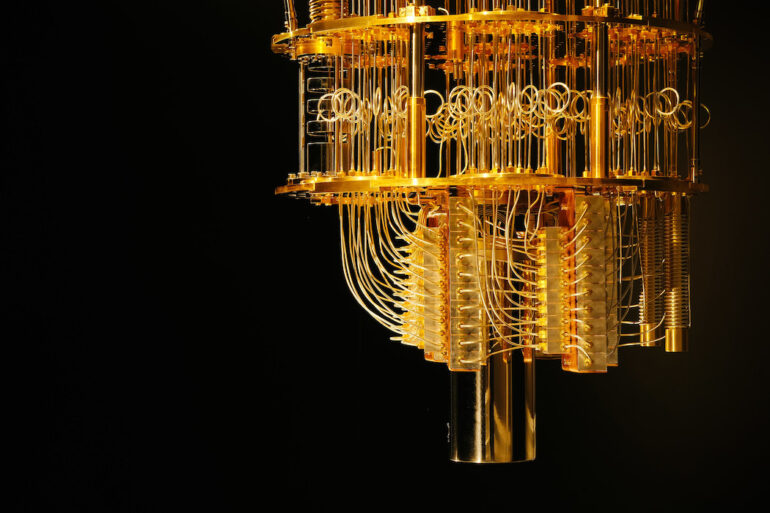Three Canadian quantum frontrunners have been chosen to participate in the first round of a United States (US) military-supported research program aiming to build a usable quantum computer by 2033.
“We are really simplifying the stack that brings a faster development roadmap toward a quantum computer.”
Julien Camirand Lemyre
Toronto-based Xanadu, Vancouver-based Photonic, and Sherbrooke, Que.-based Nord Quantique are all part of Stage A of the Quantum Benchmarking Initiative (QBI), a program run by Defense Advanced Research Projects Agency (DARPA), a research and development agency of the United States Department of Defense. They are jockeying for up to $316 million USD ($445 million CAD) in funding if they can show they can develop a fault-tolerant quantum computer that works.
The companies chosen by DARPA for the program’s first phase, which include US juggernauts Hewlett Packard Enterprise and IBM, have all charted different paths to developing a quantum computer. Xanadu focuses on photonic quantum computing and claimed this year to have solved scalability through networking quantum computers together. Photonic develops silicon spin qubits that it networks together, and Nord Quantique works on superconducting qubits with a special type of error correction at the qubit level. Qubits are the basic programming units of quantum computing.
Nord Quantique CEO Julien Camirand Lemyre said in an interview with BetaKit that he thinks his company will excel in the program because it is differentiated in the market due to its error-correction technology, one of the key frustrations in quantum computing.
“We are really simplifying the stack that brings a faster development roadmap toward a quantum computer,” Lemyre said.
RELATED: How meaningful is D-Wave’s claim to quantum supremacy?
The QBI program aims to accelerate the timeline toward a commercially usable quantum computer, as the subject has led to market volatility in the sector and debate among quantum leaders. Experts have placed estimates anywhere from five to 20 years from now.
The QBI program began as a pilot project involving Microsoft and Palo Alto, Calif.-based PsiQuantum. DARPA is responsible for technological innovations to be used by the US military, and has contributed to key milestones such as the graphical user interface, a cognitive assistant that later became Apple’s Siri, and the Internet itself. The agency has also developed lethal weapons to be used by the US armed forces, including a self-guiding bullet and killer robots.
Eighteen companies (15 of which have been revealed so far) were chosen for Stage A, where each is awarded $1 million USD to conceptualize a utility-scale quantum computer.
Those that make it to the next level, Stage B, will receive up to $15 million USD towards a research and development plan. Lemyre told BetaKit that participants would be required to supply $20 million USD of their own funding in this phase. Nord Quantique is actively looking for Canadian defence stakeholders, such as venture capital or government, to invest, he said.
RELATED: Kensington acquires One9 to establish a defence tech VC platform
Any companies that reach Stage C will work with the US government to “verify and validate” a usable quantum computer design, according to the QBI website. They will also hit the jackpot of up to $300 million USD in funding.
“It is important for Canada to match DARPA’s ambition in quantum to ensure it can remain a key player in this sector.”
Paul Terry
Photonic
The Canadian participation in this program comes amid increasing tensions between the US and Canada due to an ongoing trade war. At the same time, investors have ramped up interest in defence technology, and global military spending has hit record highs.
When asked whether he has concerns about Canadian innovation being used by the US military, Cadieux said, “Not at this point.” He added that he sees DARPA’s program as support from the US for developing quantum technology in Canada.
Photonic CEO Paul Terry told BetaKit he was pleased that DARPA chose to include non-US companies in the program, and that he hopes the program continues despite “uncertainty” related to research funding in the US. Reports indicate the US Department of Defense could be a target of funding cuts by the Elon Musk-led Department of Government Efficiency.
As for similar opportunities in Canada, Terry said Photonic has completed a contract with Innovative Solutions Canada. He added that the government must support Canadian quantum companies in getting to market first.
“It is important for Canada to match DARPA’s ambition in quantum to ensure it can remain a key player in this sector,” Terry said.
Despite the DARPA funding, Lemyre told BetaKit that the intellectual property (IP) of developments made during Stage A will remain with the participating company. However, he said that DARPA has not provided further details on what this will look like for future phases. Terry added that Stage A doesn’t focus on IP development, but rather on validating potential approaches to useful quantum computers.
A document on the QBI website states that with regard to general-purpose IP rights, “Each agreement will be negotiated separately and to the mutual benefit of both parties.”
Feature image courtesy IBM.


